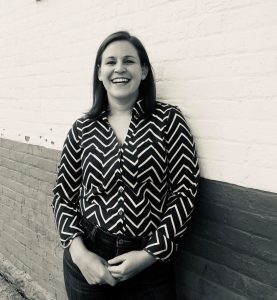
Name: Emily Channell-Justice
Current Hometown: Oxford, OH
Current Position: Visiting Assistant Professor, Department of Global and Intercultural Studies, Miami University (until June 2019); Director of the Temerty Contemporary Ukraine Program, Ukrainian Research Institute, Harvard University (effective July 2019)
Professional Interests: economic development in Ukraine and Romania, with particular interest in information technologies and tourism sectors
Why did you decide to join the Shevchenko Scientific Society?
When I was completing my PhD at the City University of New York, I began attending events at the Shevchenko Scientific Society. Between scholarly and social events, I discovered a welcoming community for researchers working in Ukraine. During my time in New York, I regularly visited the Society, and now that I am no longer living in New York, I look forward to reading the Society’s Bulletin and catching up with the familiar faces within. The Society and its members work to cultivate a program that appeals to a wide audience, with presentations on history, literature, language, and contemporary issues—it is never limited to certain fields. In order to connect with other scholars working in Ukraine, and in order to represent the discipline of anthropology among a community of Ukraine scholars, I was motivated to become a member.
What do you value about membership in the Society? What is your most memorable Society’s event or publication?
As someone coming from outside of the Ukrainian and Ukrainian-American community, I have greatly appreciated that the Society has welcomed me as a member. It is a place to cultivate connections and community that is unlike many other institutional centers. Further, I appreciate the Society’s efforts to connect scholars from all disciplines and the interested community, all of whom are passionate about Ukraine. The most memorable event was one in which I participated, a roundtable discussion of Marian Rubchak’s book New Imaginaries: Youthful Reinvention of Ukraine’s Cultural Paradigm, and of her impact on gender studies in Ukraine. In addition to Marian Rubchak herself, the event included Martha Kichorowska Kebalo, who also holds and PhD in anthropology and is active in women’s organizations, and Ella Lamakh, who has worked in gender-oriented policy and NGOs. The event was not only a discussion of the book and its contributions, but also of the current state of gender equality and activism in Ukraine. It was a well-attended and vibrant conversation that was emblematic of the events I enjoyed at the Society.
How did your interest in Ukrainian culture and society influence your career path?
I visited Ukraine for the first time in 2004, and I continued my interest in the country despite my intention to do research in my home state of West Virginia for my dissertation. In 2011, I returned to Ukraine and reconnected with a friend who had become active in the student movement in Kyiv. I was fascinated by the activism he described around issues of higher education, so I changed my dissertation topic to student activist groups in Ukraine. I attended the Ukrainian Summer School at the Ukrainian Catholic University in Lviv to study Ukrainian, and I started my research in 2012. My dissertation research changed substantially from my planned topic when I arrived in the fall of 2013, just before the Euromaidan mobilizations began, though I continued working with student activists during the protests. My experiences in Ukraine have always generated the unexpected, which I have learned to appreciate over the course of my career so far.
What is your current research/work project?
I am working on my book manuscript, based on my dissertation research, tentatively entitled Without the State: Self-Organization and Political Activism in Ukraine. I remain interested in political activism in Ukraine, and I have begun pursuing research on economic development, focusing especially on the information technology sector. This new research also includes a paper in production about waste management, which is based on research I completed in 2017 in Lviv. As part of the Ukrainian Research Institute at Harvard University, I will also be working on the ongoing MAPA project, which is a digital atlas of Ukraine that explores historical and contemporary topics. I hope to pursue questions about displacement and repatriation, as well as conflict resolution, using the existing database of the MAPA project to explore these important aspects of contemporary Ukrainian politics.
What career advice would you give for new members of the Shevchenko Scientific Society?
On the one hand, there has never been a better time to study Ukraine, given the current geopolitical situation and Russia’s continued aggression around the world. On the other, in many fields, it is difficult for Ukraine to find a place. Ukraine is marginal to those who study Europe, and at the same time, the region of Eastern Europe is often not treated as its own area of study. Researchers working in Ukraine have to find ways to make Ukraine relevant to big-picture questions in our fields. Facing an extremely challenging job market, it is more important than ever before that the community of scholars of Ukraine is mutually supportive and advocates for one another across disciplines. The Shevchenko Scientific Society’s encouragement of community-building between and among scholars, practitioners, and other interested parties is an important component of the type of advocacy I believe is necessary to continue the robust development of the field of Ukrainian studies.
